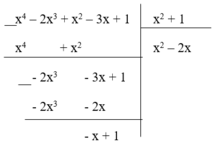
Hãy nhập câu hỏi của bạn vào đây, nếu là tài khoản VIP, bạn sẽ được ưu tiên trả lời.



Đa thức dư là – x + 1 có hệ số tự do là 1.
Đáp án cần chọn là: C

e) Ta có: \(x^4-2x^3+2x-1\)
\(=\left(x^4-1\right)-2x\left(x^2-1\right)\)
\(=\left(x^2+1\right)\left(x-1\right)\left(x+1\right)-2x\left(x-1\right)\left(x+1\right)\)
\(=\left(x-1\right)\left(x+1\right)\cdot\left(x^2-2x+1\right)\)
\(=\left(x+1\right)\cdot\left(x-1\right)^3\)
h) Ta có: \(3x^2-3y^2-2\left(x-y\right)^2\)
\(=3\left(x^2-y^2\right)-2\left(x-y\right)^2\)
\(=3\left(x-y\right)\left(x+y\right)-2\left(x-y\right)^2\)
\(=\left(x-y\right)\left(3x+3y-2x+2y\right)\)
\(=\left(x-y\right)\left(x+5y\right)\)
a) Ta có: \(x^2-y^2-2x-2y\)
\(=\left(x-y\right)\left(x+y\right)-2\left(x+y\right)\)
\(=\left(x+y\right)\left(x-y-2\right)\)
b) Ta có: \(x^2\left(x+2y\right)-x-2y\)
\(=\left(x+2y\right)\left(x^2-1\right)\)
\(=\left(x+2y\right)\left(x-1\right)\left(x+1\right)\)

a) \(x^2-2x-4y^2-4y=\left(x^2-4y^2\right)-\left(2x+4y\right)=\left(x-2y\right)\left(x+2y\right)-2\left(x+2y\right)=\left(x+2y\right)\left(x-2y-2\right)\)
b) \(x^3+2x^2+2x+1=\left(x+1\right)\left(x^2-x+1\right)+2x\left(x+1\right)=\left(x+1\right)\left(x^2-x+1+2x\right)=\left(x+1\right)\left(x^2+x+1\right)\)
c) \(x^3-4x^2+12x-27=x^3-3x^2-x^2+3x+9x-27=x^2\left(x-3\right)-x\left(x-3\right)+9\left(x-3\right)=\left(x-3\right)\left(x^2-x+9\right)\)
d) \(a^6-a^4+2a^3+2a^2=a^2\left(a^4-a^2+2a+2\right)=a^2\left[a^2\left(a-1\right)\left(a+1\right)+2\left(a+1\right)\right]=a^2\left(a+1\right)\left(a^3-a^2+2\right)=a^2\left(a+1\right)\left[a^3+a^2-2a^2+2\right]=a^2\left(a+1\right)\left[a^2\left(a+1\right)-2\left(a-1\right)\left(a+1\right)\right]=a^2\left(a+1\right)^2\left(a^2-2a+2\right)\)
a) Ta có: \(x^2-2x-4y^2-4y\)
\(=\left(x^2-4y^2\right)-\left(2x+4y\right)\)
\(=\left(x-2y\right)\left(x+2y\right)-2\left(x+2y\right)\)
\(=\left(x+2y\right)\left(x-2y-2\right)\)
b) Ta có: \(x^3+2x^2+2x+1\)
\(=\left(x^3+1\right)+2x\left(x+1\right)\)
\(=\left(x+1\right)\left(x^2-x+1\right)+2x\left(x+1\right)\)
\(=\left(x+1\right)\left(x^2+x+1\right)\)

\(=x^3\left(x+2\right)-x\left(x+2\right)\)
\(=\left(x+2\right)\cdot x\cdot\left(x+1\right)\left(x-1\right)\)
Vì đây là tích của bốn số nguyên liên tiếp
nên \(\left(x+2\right)\cdot x\cdot\left(x+1\right)\cdot\left(x-1\right)⋮24\)

a.
$x^2-y^2-2x+2y=(x^2-y^2)-(2x-2y)=(x-y)(x+y)-2(x-y)=(x-y)(x+y-2)$
b.
$x^2(x-1)+16(1-x)=x^2(x-1)-16(x-1)=(x-1)(x^2-16)=(x-1)(x-4)(x+4)$
c.
$x^2+4x-y^2+4=(x^2+4x+4)-y^2=(x+2)^2-y^2=(x+2-y)(x+2+y)$
d.
$x^3-3x^2-3x+1=(x^3+1)-(3x^2+3x)=(x+1)(x^2-x+1)-3x(x+1)$
$=(x+1)(x^2-4x+1)$
e.
$x^4+4y^4=(x^2)^2+(2y^2)^2+2.x^2.2y^2-4x^2y^2$
$=(x^2+2y^2)^2-(2xy)^2=(x^2+2y^2-2xy)(x^2+2y^2+2xy)$
f.
$x^4-13x^2+36=(x^4-4x^2)-(9x^2-36)$
$=x^2(x^2-4)-9(x^2-4)=(x^2-9)(x^2-4)=(x-3)(x+3)(x-2)(x+2)$
g.
$(x^2+x)^2+4x^2+4x-12=(x^2+x)^2+4(x^2+x)-12$
$=(x^2+x)^2-2(x^2+x)+6(x^2+x)-12$
$=(x^2+x)(x^2+x-2)+6(x^2+x-2)=(x^2+x-2)(x^2+x+6)$
$=[x(x-1)+2(x-1)](x^2+x+6)=(x-1)(x+2)(x^2+x+6)$
h.
$x^6+2x^5+x^4-2x^3-2x^2+1$
$=(x^6+2x^5+x^4)-(2x^3+2x^2)+1$
$=(x^3+x^2)^2-2(x^3+x^2)+1=(x^3+x^2-1)^2$

\(x^4+2x^3+x^2-y^2=x^2\left(x+1\right)^2-y^2\\ =\left[x\left(x+1\right)-y\right]\left[x\left(x+1\right)+y\right]\\ =\left(x^2+x-y\right)\left(x^2+x+y\right)\\ x^3+x^2-2x-8=x^3-2x^2+3x^2-6x+4x-8\\ =\left(x-2\right)\left(x^2+3x-4\right)\)

3: \(x^4-13x^2+36\)
\(=x^4-9x^2-4x^2+36\)
\(=\left(x^2-9\right)\left(x^2-4\right)\)
\(=\left(x-3\right)\left(x+3\right)\left(x-2\right)\left(x+2\right)\)
4: \(x^4+3x^2-2x+3\)
\(=x^4+x^3+3x^2-x^3-x^2-3x+x^2+x+3\)
\(=\left(x^2+x+3\right)\left(x^2-x+1\right)\)
5: \(x^4+2x^3+3x^2+2x+1\)
\(=x^4+x^3+x^2+x^3+x^2+x+x^2+x+1\)
\(=\left(x^2+x+1\right)^2\)

1/(x+2)2 -(3x-1)2=(x+2+3x-1)(x+2-3x+1)=4x(-2x+3)=-8x2+12x
2/(x4+x2)(-2x3-2x)=x2(x2+1)-2x(x2+1)=(x2+1)(x2-2x)

a) Ta có: \(\dfrac{4x^2-3x-7}{A}=\dfrac{4x-7}{2x+3}\)
\(\Leftrightarrow A=\dfrac{\left(2x+3\right)\left(4x^2-3x-7\right)}{4x-7}\)
\(\Leftrightarrow A=\dfrac{\left(2x+3\right)\left(4x-7\right)\left(x+1\right)}{4x-7}\)
\(\Leftrightarrow A=\left(2x+3\right)\left(x+1\right)\)
\(\Leftrightarrow A=2x^2+5x+3\)
b) Ta có: \(\dfrac{1}{B}=\dfrac{a+b}{a^3+b^3}\)
\(\Leftrightarrow\dfrac{1}{B}=\dfrac{a+b}{\left(a+b\right)\left(a^2-ab+b^2\right)}=\dfrac{1}{a^2-ab+b^2}\)
hay \(B=a^2-ab+b^2\)

ta có :
\(x^4-1-\left(2x^3-2x\right)=\left(x^2-1\right)\left(x^2-2x+1\right)\)
Vậy \(x^4-1-\left(2x^3-2x\right):\left(x^2-1\right)=x^2-2x+1\)